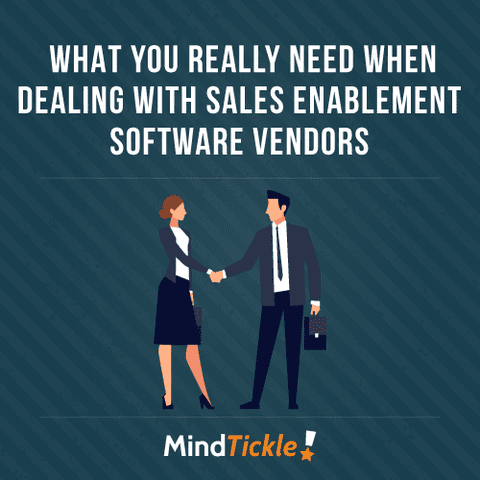 Purchasing sales enablement software isn’t as simple as deciding what features you want and ticking them off a list. That’s because sales enablement as an industry is at a nascent stage which makes it difficult to know exactly what your business will need today, tomorrow, and into the future.
Purchasing sales enablement software isn’t as simple as deciding what features you want and ticking them off a list. That’s because sales enablement as an industry is at a nascent stage which makes it difficult to know exactly what your business will need today, tomorrow, and into the future.
Sales leaders are also still defining what they need and want from sales enablement. The objectives, success factors and KPIs for sales enablement are still being defined and may continue to evolve. That’s where the right vendor can empower a business to shape its sales enablement strategy in a way that meets its long-term objectives.
Having worked in both Customer Success and Sales, I’ve seen how challenging it can be for a customer to make the right decision, and how that decision can impact their business either positively or negatively. Many businesses tend to start with training and select their software based on the features they need. But enabling a sales force is rarely just about training – it may require a wide range of activities including content, structured coaching, process improvement, and internal communication. It often also requires reporting to sales management that helps identify gaps and opportunities.
The challenge for any sales enablement function is identifying and solving the bigger issues that are impacting their reps. If your sales enablement function is relatively new, you may still be identifying issues and prioritizing them, or trying to anticipate what your business needs in the medium to long-term future. This can be even more confusing if you’re having to deal with salespeople who are focused on selling you software rather than helping you solve your problem.
Start with your end-goal
Tools are an enabler but they’re not the end-game. Before purchasing software it’s important to identify what you want to achieve. Perhaps identify your top sales enablement initiatives for the next one to three years and align these with the objectives of your sales leadership team. These initiatives will depend on your specific business needs. Some examples include revamping your sales onboarding, instigating a manager-led coaching program or ensuring your reps can articulate your value proposition consistently.
Each of your initiatives should be based on the outcomes that you and your business want to achieve. Questions that may be helpful to ask here include:
- What do your leaders want to achieve?
- What do our frontline reps want and need?
- What do our sales managers want and need?
If you’re speaking with a software vendor at this stage they should be able to help you define each of these questions and unravel your issues and help you find a way to solve them. At this point, it’s best not to focus on product features, but rather look at how you can elevate your sales game.
Focus on a partnership
Of course, the features that your sales readiness platform has are important, but a solution needs to have the flexibility and capability to meet your needs now and in the future. This is where it’s important for you to look at the product roadmap and see what’s coming in the future and understand how that may help your organization.
Ask the vendor how they develop their product roadmap and determine its direction. Some take onboard feedback from customers, while others may develop their strategy based on the whims and fancies of a handful of product geeks.
Value transparency and honesty
Software vendors shouldn’t just be there to sell you their platform. What’s most important is that you find the right solution for your business. There’s no point trying to force fit a solution, it will only end up costing you more in the long-run. That’s why I’ve actually referred some prospects to other solutions when I know that we don’t have the solution to their problems. It doesn’t help our customers to end up with a platform that doesn’t address their needs.
That’s where transparency and honesty are important. Every sales enablement platform has its strengths and weaknesses. The key is for you to find the platform that best meets your needs now and in the future. Sales reps play a valuable role in the process of deciding which sales enablement platform is right for your business. A good vendor salesperson will help you solve the problems you’re facing so that your sales can be elevated.








